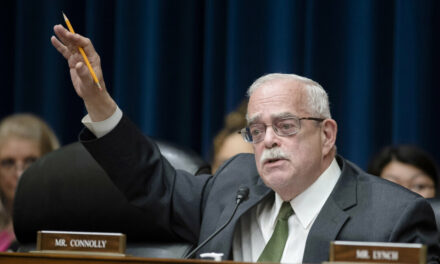We support our Publishers and Content Creators. You can view this story on their website by CLICKING HERE.
The Republicans’ slim majorities, especially in the Senate, mean some Democratic support may be necessary to pass key initiatives.
WASHINGTON—As the Trump administration prepares to enter office with his party controlling both the Senate and the House of Representatives, some Democrats are identifying areas where they seek to collaborate with the GOP during the upcoming 119th Congress.
Republicans will control both houses, but their majorities will be narrow—three seats in the House and Senate, respectively, with the latter being below the threshold required to invoke cloture and overcome a filibuster. Given these conditions, Democratic support may be necessary to attain the passage of several policy initiatives. At the No Labels National Conference on Dec. 12, Democratic members of Congress suggested where their support will be forthcoming.
“We have no choice but to address the issue of border security,” said Rep. Ritchie Torries (D-N.Y.). “There’s no Democratic or Republican way to take out the trash. … We have to see border security and public safety not as a left-wing or right-wing position.”
Torres said his party’s position on the issue contributed to Vice President Kamala Harris’s loss in the 2024 presidential election. President-elect Donald Trump, by contrast, has made deporting all illegal immigrants his top priority when he takes office.
“We have to get serious about border security. …We swung the pendulum too far to the left on immigration,” Torres remarked. His emphasis on border security and the related issue of immigration reform was endorsed by other Democrats at the No Labels Convention.
“I think there’s a lot more we could do on border policies … border security, creating safe zones in Central American countries that deal with the migration that’s coming up,” said Rep. Vincente Gonzalez (D-Texas). “I see in this administration [the possibility] to pass a lot of policy proposals that we couldn’t get in a Democratic administration.”
“Comprehensive immigration reform” was the answer given by Rep. Susie Lee (D-Nev.) as an issue where realistic compromise could be achieved. However, she cautioned: “We really need to be disciplined” and not always reacting to Trump.
“One of the major areas we’re all facing this year … is immigration,” said Rep. Ed Case (D-Hawaii). “Everybody up here is ready for some kind of consensus immigration reform bill,” he added, even if it contained some conservative provisions. “I know that my constituents … aren’t going to like some of that immigration bill,” he noted.
Another area where the Democrats believed compromise could be achieved is government streamlining, specifically relating to the Department of Government Efficiency (DOGE) initiative of the Trump administration run by Elon Musk and Vivek Ramaswamy.
“I see the emergence of a bicameral [and] bipartisan commitment to improving the efficiency of government, which includes the needs of streamlined permitting processes and streamlined environmental review,” said Torres. Permitting reform, which affects the timeline of construction projects, was mentioned by both Democrats and Republicans at the conference as an issue of focus.
“Everything takes forever. … People are really frustrated,” said Rep. Josh Gottheimer (D-N.J.).
“We know that permitting reform may get done in this Congress,” said Lee. “I’m going to see what DOGE produces. … We just got to shrink federal government,” said Sen. Tim Kaine (D-Va.), signaling his willingness to consider supporting their proposals.
Still, some Democrats noted that bipartisanship in these areas would not be automatic, particularly in the House. “It’s the House that’s going to be a real challenge. … You have people in seats that are swingy, and midterms are coming up, so that’s going to affect everything,” said Gottheimer.
“There has not been a clear mandate in any direction,” said Rep. Don Davis (D-N.C.), who won a close reelection contest in November. “We’re going to still see close margins [in Congress].”

 Conservative
Conservative  Search
Search Trending
Trending Current News
Current News 







